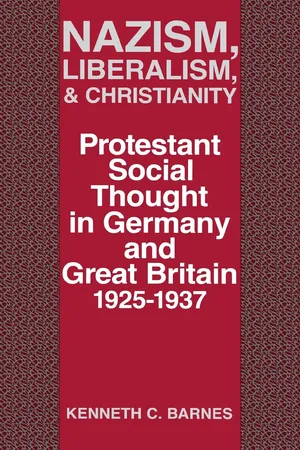
Nazism, Liberalism, and Christianity
Protestant Social Thought in Germany and Great Britain, 1925-1937
- 216 pages
- English
- PDF
- Available on iOS & Android
Nazism, Liberalism, and Christianity
Protestant Social Thought in Germany and Great Britain, 1925-1937
About This Book
The Great Depression devastated the economies of both Germany and Great Britain. Yet the middle classes in the two countries responded in vastly different ways. German Protestants, perceiving a choice among a Bolshevik-style revolution, the chaos and decadence of Weimar liberalism, and Nazi authoritarianism, voted Hitler into power and then acquiesced in the resulting dictatorship. In Britain, Labour and Tory politicians moved gingerly together to form a National Government that muddled through the Depression with piecemeal reform.
In this troubling book about troubled times, Kenneth Barnes looks into the question of how theologians and church leaders contributed to a cultural matrix that predisposed Protestants in these two countries to very different political alternatives. Holding fast to the liberal social gospel, British churchmen diagnosed the problems of the 1920s and the Depression ao solvable and called for genuine reforms, many of which foreshadowed the coming welfare state. German leaders, in contrast, were terrified by the socioeconomic and political problems of the Weimar era and offered no social message or solution. Despairingly, they referred the problems to secular politicians and after 1933 beat the drum for obedience to the Nazi state.
Based on extensive research in European archives, especially the rich papers of the interwar ecumenical movement housed at the World Council of Churches in Geneva, this book examines key intellectual figures such as Karl Barth, Paul Tillich, Dietrich Bonhoeffer, and Archbishop William Temple, as well as many lesser known church officials and theologians. Barnes brings to life the intellectual struggles and dilemmas of the interwar period to help explain why good people could, for moral and religious reasons, choose opposing courses of political action.
Frequently asked questions
Information
Table of contents
- Cover
- Half-title
- Title
- Copyright
- Contents
- Acknowledgments
- 1. Introduction
- 2. The British and German Traditions
- 3. Protestant Social Thought, 1925-1929
- 4. Response to the Economic Crisis, 1930-1933
- 5. The Social Message and the Nazi State, 1933-1937
- 6. Conclusion
- Notes
- Selected Bibliography
- Index